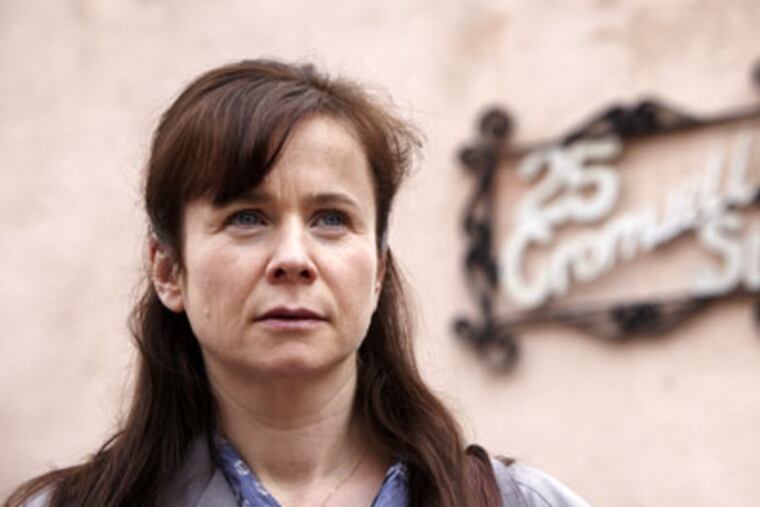Disturbingly close to a serial killer
Do cinematic serial killers scare us anymore? The species has become so nearly ubiquitous in the 20 years since Jonathan Demme's The Silence of the Lambs won the Oscar for best picture, they've become toothless stock characters in pictures that try to outdo one another in body count and gore.

Do cinematic serial killers scare us anymore?
The species has become so nearly ubiquitous in the 20 years since Jonathan Demme's The Silence of the Lambs won the Oscar for best picture, they've become toothless stock characters in pictures that try to outdo one another in body count and gore.
Not so Fred West, the real-life British rapist and killer portrayed with unnerving cunning by The Wire's Dominic West in one of the few truly terrifying serial-killer films in years, Appropriate Adult, which the Sundance Channel will telecast Saturday night at 10.
A stunning 150-minute shocker, it's all the more remarkable since it doesn't show a single drop of blood.
Yep. There are no screaming madmen waving knives. No flashbacks to bloody orgies of violence. No close-ups of victims' faces twisted in pain.
It's just as well, since the film was surrounded with controversy from the moment it was first announced.
"This is one of the three most notorious cases in the United Kingdom in the last 100 years," says the film's British writer and executive producer, Neil McKay, who has written films about the two other cases, See No Evil: The Moors Murders (2006) and This Is Personal: The Hunt for the Yorkshire Ripper (2000).
McKay says his decision not to sensationalize the story helped defuse the controversy. Its release, as a two-part mini-series on Britain's ITV, was met with largely positive reviews.
This doesn't mean Appropriate Adult is not violent - it is shockingly so.
The film "is about psychological violence and the way people who commit these murders manipulate other people," McKay says.
Appropriate Adult, which costars Emily Watson and Robert Glenister (MI-5, Law & Order: U.K.), tells the story of Fred and Rosemary West (Monica Dolan), an ordinary middle-class couple with seven children who tortured, raped, and murdered a dozen women in their home in the southwest English city of Gloucester between 1967 and 1987. Their victims included their own daughters. (They began raping one daughter when she was 8.)
Set in 1994, the film opens with the discovery of human bones in the couple's backyard. We are treated (if that's the word) to detailed accounts of Fred West's police interrogations and Rosemary West's murder trial - Fred committed suicide before his trial.
How does one depict events and people that seem to defy explanation?
McKay tells the story through the eyes of a young, inexperienced social worker named Janet Leach who was assigned as Fred West's appropriate adult, a person usually with social work experience who is supposed to look out for the accused if he is a minor, or mentally handicapped. (The police brought in an appropriate adult to guard against the possibility of a mistrial down the road.)
"Leach is our way in. Like us, she comes from the outside and knows nothing about the case," McKay says. "I wanted to show what it would be like for any of us to walk into such a situation. How would we deal with it?"
McKay spent two years researching the project, in the process amassing hundreds of hours of interviews with Leach, whom he says he admires tremendously.
Leach is portrayed with heartbreaking candor and vulnerability by Watson, who was nominated for an Oscar for her performance in the 1996 Breaking the Waves.
"Emily gave an incredibly close representation of the way [Leach] speaks and moves and got all her mannerisms," McKay says. "I don't think I've seen anything like it from any actor in my career."
Watson says she wasn't sure at first she wanted to star in the film.
"I thought about it very carefully," she says. "But I was convinced once I read Neil's script. It had these extraordinary 12-, 13-page scenes of dialogue."
To prepare for the role, Watson, 44, also spent time with Leach.
"She had very little experience and was very naive," Watson says. "Not so rare, since appropriate adults were brought in with very little training."
Initially disgusted by the crimes attributed to West, Leach stays with the case and becomes dangerously close to West.
"I felt [Leach] had been duped, manipulated, and badly treated by West," Watson says. "West spotted her the moment she walked in."
A disturbing love story of sorts develops.
"It turned out that Janet [Leach] had a close resemblance to Fred's true love, if you could call it that," says McKay. "She was a nanny to his children and he fell for her. And then murdered her."
Leach plays along with West, becoming sort of a surrogate lover to him, though not in a physical way, says Watson. At first, it was a strategic move to coax him to confess to his other murders. (West boasted he had killed 20 other women.)
"Then she begins visiting him in prison on her own," Watson says. "She came closer and closer to him in this bizarre relationship and she lost her moral framework."
Leach recovered after years of therapy, says McKay.
If there's a glut of serial-killer stories, why make Appropriate Adult?
McKay says the West story may help us guard against the temptation to attribute evil only to people who are different. "The shock of it was that it happened within a seemingly ordinary household," he says. "That is why it so convulsed this country."
It's a lesson, he says, that "evil doesn't come from outer space."